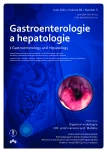-
Medical journals
- Career
Perspectives of biological therapy on inflammatory bowel disease
Authors: M. Lukáš
Authors‘ workplace: Klinické a výzkumné centrum pro střevní záněty ISCARE I. V. F. a. s. a Ústav lékařské biochemie a laboratorní diagnostiky 1. LF UK a VFN v Praze
Published in: Gastroent Hepatol 2014; 68(3): 225-229
Category: Important Anniversary: Review Article
Práce je věnována památce prof. MUDr. Zdeňka Mařatky, DrSc. u příležitosti 100. výročí jeho narození.
Overview
Despite the introduction and widespread use in clinical practice of antiTNFα drugs, the current situation of medicamentous therapy in inflammatory bowel diseases cannot be considered as ideal. The short-term anti-inflammatory effects and numerous side-effects, particularly infections, are the drawbacks for the current biological therapy. The innovative approach includes efforts to find new indications, starting these shortly after the diagnosis and using the current biological agents as a prophylactic therapy against post-operative recurrence of Crohn´s disease. A new biological molecule which has already been approved for clinical practice – vedolizumab – mediated its anti-inflammatory effects by inhibiting the migration of white blood cells in the tissue, specifically in the gastrointestinal tract. There is a reason that its anti-inflammatory effects are not associated with systemic immunosuppression and with infectious complications. The candidates for therapy in clinical practice of Crohn´s disease and ulcerative colitis in the future are ustekinumab and tofacitinib.
Key words:
biological therapy – vedolizumab – ustekinumab – tofacitinib
The author declares he has no potential conflicts of interest concerning drugs, products, or services used in the study.
The Editorial Board declares that the manuscript met the ICMJE „uniform requirements“ for biomedical papers.Submitted:
5. 5. 2014Accepted:
6. 6. 2014
Sources
1. Bortlík M, Ďuricová D, Kohout P et al. Doporučení pro podávání biologické terapie u idiopatických střevních zánětů: 2. vydání. Gastroent Hepatol 2012; 66(1): 12–22.
2. Dignass A, Lindsay JO, Sturm A et al. Second European evidence-based consensus on the diagnosis and management of ulcerative colitis part 2: current management. J Crohns Colitis 2012; 6(10): 991–1030. doi: 10.1016/j.crohns.2012.09.002.
3. Cosnes J, Bourrier A, Laharie D et al. Early administration of azathioprine vs conventional management of Crohn´s Disease: a randomized controlled trial. Gastroenterology 2013; 145(4): 758–765. doi: 10.1053/j.gastro.2013.04.048.
4. Panés J, López-Sanromán A, Bermejo F et al. Early azathioprine therapy is no more effective than placebo for newly diagnosed Crohn´s disease. Gastroenterology 2013; 145(4): 766–774. doi: 10.1053//j.gastro.2013.06.009.
5. Lukáš M. Současnost a budoucnost v léčbě Crohnovy nemoci. Gastroent Hepatol 2013; 67(4): 306–312.
6. Mosli MH, Rivera-Nieves J, Feagan BG. T-cell trafficking and anti-adhesion strategies in inflammatory bowel disease: current and future prospects. Drugs 2014; 74(3): 297–311. doi: 10.1007//s40265-013-0176-2.
7. Sandborn WJ, Gasink C, Gao LL et al. Ustekinumab induction and maintenance therapy in refractory Crohn´s disease. N Engl J Med 2012; 367(16): 1519–1528. doi: 10.1056/NEJMoa1203572.
8. Feagan BG, Rutgeerts P, Sands BE et al. Vedolizumab as induction and maintenance therapy for ulcerative colitis. N Engl J Med 2013; 369(8): 699–710. doi: 10.1056//NEJMoa1215734.
9. Sandborn WJ, Ghosh S, Panes J et al. Tofacitinib, an oral Janus kinase inhibitor, in active ulcerative colitis. N Engl J Med 2012; 367(7): 616–624. doi: 10.1056/NEJMoa1112168.
10. Sandborn WJ, Feagan BG, Rutgeerts P et al. Vedolizumab as induction and maintenance therapy for Crohn´s disease. N Engl J Med 2013; 369(8): 711–721. doi: 10.1056/NEJMoa1215739.
11. Tillack C, Ehmann LM, Friedrich M et al. Anti-TNF antibody-induced psoriasiform skin lesions in patients with inflammatory bowel disease are characterised by interferon-γ-expressing Th1 cells and IL-17A//IL-22-expressing Th17 cells and respond to anti-IL-12/IL-23 antibody treatment. Gut 2014; 63(4): 567–577. doi: 10.1136//gutjnl-2012-302853.
Labels
Paediatric gastroenterology Gastroenterology and hepatology Surgery
Article was published inGastroenterology and Hepatology

2014 Issue 3-
All articles in this issue
- Unusual ERCP complication
- Professor Zdeněk Mařatka
- 100 years since the birth of Professor Zdeněk Mařatka
- Ideo centisimi
- The efficiency of colonic capsule endoscopy in detection of colorectal polyps and cancers compared to colonoscopy – multicenter, prospective, cross-over study
- Perspectives of biological therapy on inflammatory bowel disease
- Rifaximin in the treatment of gastrointestinal diseases
- Experimental electrogastrography
- Acute upper gastrointestinal bleeding – a rare manifestation of pancreatic adenocarcinoma
- Plants in the therapy of inflammatory bowel disease
- 4th Prague endoscopic day and 15th endoscopic day IKEM
- 87th congress of Japan Gastroenterological Endoscopy Society, Fukuoka, 15.–17. 5. 2014, Japan
- XVIIIth gastroenterology and hepatology days in Hradec Králové and VIIIth international endoscopic workshop
- Looking back at the 10th Congress EAGEN Postgraduate School in Prague
- Golimumab – new biologic for therapy of ulcerative colitis
- In memory of deceased Prof. Bohumil Fixa, MD, DSc.
- Citrafleet® – simple and effective bowel preparation before the procedure
- Digestive endoscopy
- Water-aided colonoscopy
- Comparison of dietary habits of patients with colorectal neoplasias and their first-degree relatives
- Combined endoscopic and laparoscopic treatment of acute bleeding from gastric metastases from renal cell carcinoma – video case report
- Painless colonoscopy
- Gastroenterology and Hepatology
- Journal archive
- Current issue
- Online only
- About the journal
Most read in this issue- Rifaximin in the treatment of gastrointestinal diseases
- Citrafleet® – simple and effective bowel preparation before the procedure
- Acute upper gastrointestinal bleeding – a rare manifestation of pancreatic adenocarcinoma
- Unusual ERCP complication
Login#ADS_BOTTOM_SCRIPTS#Forgotten passwordEnter the email address that you registered with. We will send you instructions on how to set a new password.
- Career

